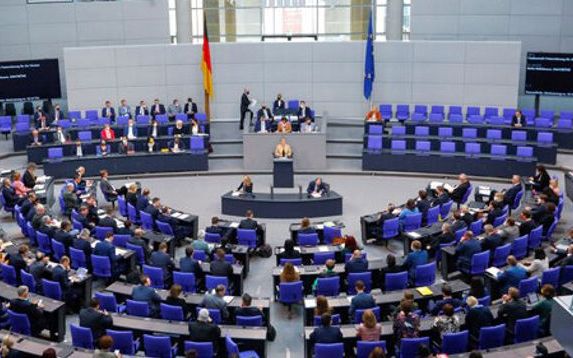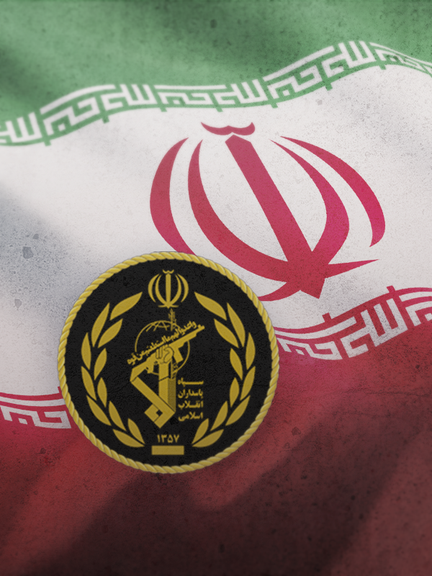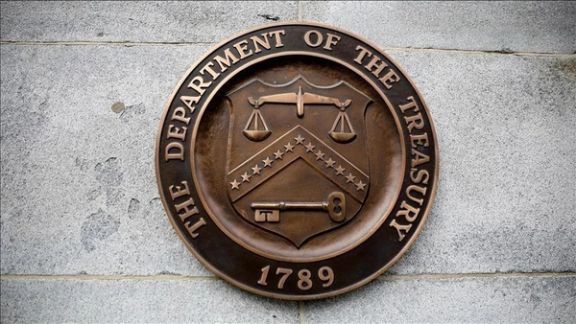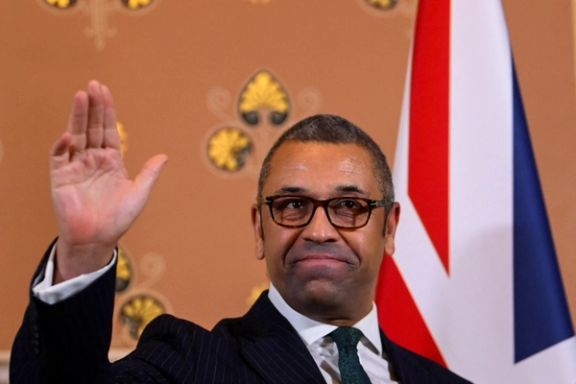Germany Halts Guarantees For Business With Iran

Germany has suspended all export credits and investment guarantees for companies doing business with Iran as a measure against government’s harsh treatment of protesters.

Germany has suspended all export credits and investment guarantees for companies doing business with Iran as a measure against government’s harsh treatment of protesters.
The Economy Ministry said in a statement Friday that it was taking the step “in view of the very serious situation in Iran”.
It added that other “economic formats,” including a dialogue on energy issues have been suspended too.
Export credit guarantees protect German firms from losses if the exports are not paid for. Investment guarantees are given to safeguard direct investments by German companies from political risk in target countries.
The ministry further underlined in its statement that Germany Trade and Invest as well as the German business delegation in Iran had “reduced their activities to a minimum”.
The investment guarantees would be suspended immediately, according to the statement, but export credit guarantees will be placed on hold from January, and there would be some exceptions in case of a humanitarian need.
Trade guarantees with the Islamic Republic had been on hold for many decades but following the nuclear deal signed between Iran and the P5+1 group of countries they were lifted in 2016.
The trade volume between Tehran and Berlin was 1.76 billion euros ($1.87 billion) in 2021 and 1.49 billion euros in the first nine months of this year, the ministry said.

A group of 43 members of the Social Democratic Party in the German Parliament demanded that the Islamic Revolutionary Guard – or IRGC --be designated as a terrorist group.
Some representatives said, "A regime that defends its survival only by assassinating its own people has lost its legitimacy." Considering that other German parties such as Alliance 90/The Greens, and Free Democratic Party also seem to favor such a measure, it is possible that the IRGC will be blacklisted by Berlin and the European Union. The list of countries that have designated the Revolutionary Guard is increasing.
Kaweh Mansoori, a member of the party with Iranian roots, also said, "We are ready to take tougher and more intense steps than the previous sanctions of the European Union against the barbaric clerical regime.”
In November, the German parliament – the Bundestag -- passed a comprehensive package of measures against the Islamic Republic following a session on the current situation in Iran. The ratified motion, submitted by a coalition of factions, called on the German government to support the protest movement in Iran and increase pressure on the regime in Tehran.
The lawmakers also called to further examine whether and how the Islamic Center in Hamburg (IZH) can be closed for good, calling it "the hub of the operations of the Iranian regime in Germany.” Germany has already expelled Iranian cleric Soleiman Mousavifar, who was the deputy head of the IZH, from the country for his support for Shiite extremist and terrorist organizations.
Moreover, on Thursday the Dutch Parliament passed a motion urging the government to support EU's proscription of IRGC as a terrorist organization, considering the repression of protesters and supply of drones to Russia.
The motion was introduced to designate the IRGC as a terrorist group both at the national and European level.
Earlier this month, the EU designated 20 people and Iran’s state media over reported human rights abuses, along with eight people or entities over sending drones to Russia.
The pressure on the IRGC is not limited to putting it on the list of terrorist organizations, as there are other demands about human right issues related Tehran’s crackdown of dissent.
Several members of the German parliament have politically sponsored Iranian political prisoners most of whom are in danger of imminent execution on bogus charges. The number of German MPs taking political sponsorship of Iranian protesters is growing. Political patronage or sponsorship (politische patenshaften in German) is a way for the lawmakers to select a specific political prisoner and use their political weight to campaign for the prisoner’s freedom. This is mainly done by addressing the ambassador and the relevant government and international institutions dealing with human rights.
Also on Tuesday, all 183 members of the Council from four major parties said they will sponsor 183 prisoners including those sentenced to death for their participation in the current wave of antigovernment protests in Iran, ignited by the death in custody of 22-year-old Mahsa Amini.

The Dutch Parliament on Thursday passed a motion that urges the government to support EU's proscription of IRGC as a terrorist organization, considering the repression of protesters and supply of drones to Russia.
The motion was introduced to designate Iran’s Revolutionary Guard (IRGC) as a terrorist group both at the national and European level.
Don Ceder, Member of House of Representatives of Netherland told Iran international that putting pressure on the regime in Iran is necessary to make sure it upholds all the human rights of the people.
“We have proposed many sanctions in many ways on a national level, also on a European level, because we feel that we are in solidarity with the people of Iran,” he added.
He said Dutch parliamentarians are calling upon the Iranian government to uphold the human rights path policies and ensure that people have the freedom to demonstrate and to stop any planned executions.
“I have submitted a motion to even regard the IRGC as a terrorist group. So, this is something we are talking about in the parliament to see if it gets a majority. We are really advocating sanctions on a national level, but also at the European level,” he noted.
Earlier this month, the EU designated 20 people and Iran’s state media over reported human rights abuses, along with eight people or entities over sending drones to Russia.

The scope of US sanctions on Islamic Republic officials is growing with more and more international punitive measures against the crackdown on dissent by the regime.
The United States Treasury Department on Wednesday imposed sanctions on several Iranian officials, including the Prosecutor General Mohammad Montazeri, and key military officials accusing them of issuing a directive to courts in September to hand out harsh sentences to many of those arrested during protests.
“We denounce the Iranian regime’s intensifying use of violence against its own people who are advocating for their human rights,” said Under Secretary of the Treasury for Terrorism and Financial Intelligence Brian E. Nelson. “The United States and our partners are dedicated to holding Iranian officials to account for egregious abuses committed against Iranian citizens fighting for their fundamental freedoms.”
Also blacklisted was Iranian company Imen Sanat Zaman Fara, which the Treasury said manufactures equipment for Iran's Law Enforcement Forces, including armored vehicles used in crowd suppression.
Washington also imposed sanctions on two senior officials of Iran’s Basij Forces, a militia affiliated with the Revolutionary Guards that has been widely deployed during the crackdown, and two Islamic Revolutionary Guard Corps (IRGC) officials. The two are Moslem Moein, the chief of the Basij Cyberspace Headquarters, and Deputy Coordinator of the Basij, Hossein Maroufi. Hassan Hassanzadeh, the commander of IRGC forces in Tehran, and Seyyed Sadegh Hosseini, the commander of the Beit-al Moghadas Corps and IRGC Commander in Kordestan province were also designated in the latest move.
The move is the latest in a series of actions Washington has taken against Iranian officials over the regime’s crackdown on the unrest ignited by the death of Amini in September.
The United States, Canada ad their European allies have united against the regime’s crackdown on protesters especially after the Islamic Republic executed two detained protesters just for participating on the rallies.
The US-based Human Rights Activists News Agency (HRANA) announced in its latest report that from September 16 until Tuesday, December 20, at least 506 protestors have been killed, of which at least 69 were minors.
While the Islamic Republic has not provided accurate figures of those detained, the watchdog went on to say that at least 18,457 protesters have been arrested including 652 students.

US President Joe Biden has launched a task force to see how US and western components are ending up in Iranian drones used in Russia’s war on Ukraine.
CNN reported Wednesday that different departments including Justice, Treasury, Defense, Commerce and State are involved in the task force.
Although strict measures were in effect to prevent the Islamic Republic from obtaining such materials, some evidence shows Tehran has more than enough access to US-made microelectronics that are used in manufacturing drones.
Last month, a UK-based investigative organization found that over 80 percent of the drones downed in Ukraine have components made by US companies.
Conflict Armament Research investigations revealed that processors built by Dallas-based technology company Texas Instruments as well as engines made by Austrian firm owned by Canada’s Bombardier Recreational Products have been used in the drones.
However, both tech companies in separate statements slammed the use of their products in the drones.
Bombardier Recreational Products said it had launched an investigation to see how its engines are used in the drones.
Microelectronic parts, however, are widely available to ordinary consumers even online.
Ukraine’s defense intelligence (GUR) spokesman Andriy Yusov said Monday that Russia has received a new shipment of Iranian-made Shahed-136 kamikaze drones from Iran.
Iran's foreign minister Hossein Amir-Abdollahian once again denied Iran has supplied drones to Russia to be used against Ukraine Monday, while previously he had acknowledged having provided drones to Moscow "before the Ukraine war began."

British Secretary of State James Cleverly says his country has sanctioned more than 40 officials of the Islamic Republic since the beginning of the protests in Iran.
UK’s foreign policy chief said in a tweet on Friday that “Three months ago today, Mahsa Amini died after her arrest by Iran’s 'Morality Police'. Since then, we've sanctioned over 40 Iranian officials.”
He further added that in total, the UK has sanctioned over 300 people and entities, including the IRGC in its entirety.
Nationwide protests that erupted after the death in police custody of 22-year-old Kurdish Iranian woman Mahsa Amini on September 16 have posed one of the biggest challenges to the Islamic Republic since its establishment in 1979.
Britain announced sanctions December 9 against 30 people worldwide, including Iranian officials, for serious rights violations, such as the violence on protesters.
Iran executed the first detained protester December 8 after a sham trial, sparking worldwide outrage and condemnations. The execution is seen as part of a government strategy to intimidate ordinary people and activists from pursuing the almost three-month-old antigovernment protests movement.
In mid-November, Britain had slapped a new round of sanctions on 24 Iranian officials who played a role in cracking down on protests.
In a press release the United Kingdom announced that the “sanctions target officials within the Iranian regime who are responsible for heinous human rights violations.”